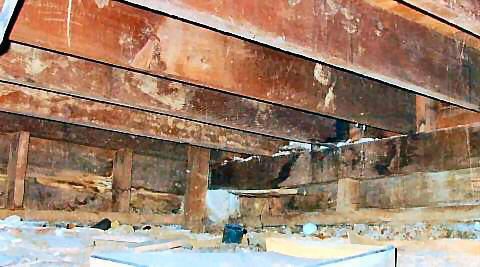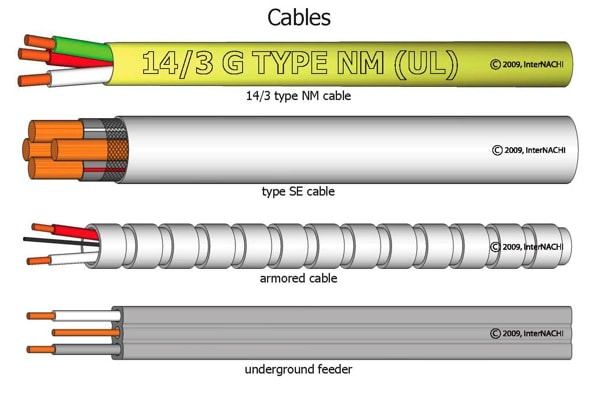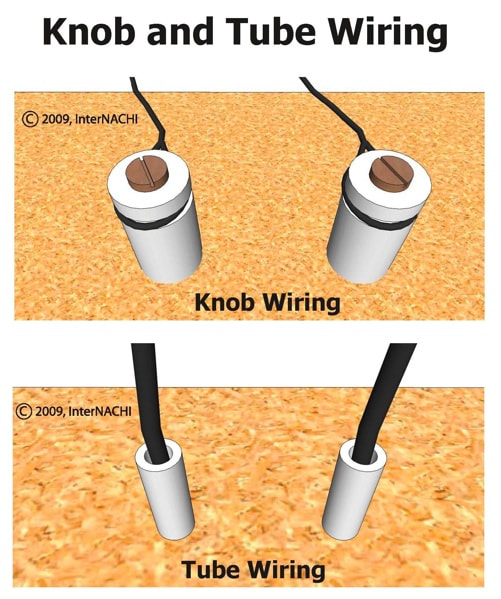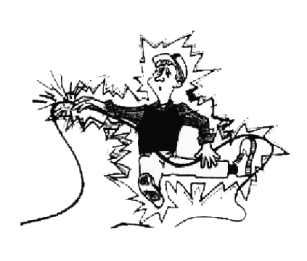long periods of time. The following are some of the more common dangers discovered in crawlspaces: Mold & Fungus
Pests (wood destroying organism)
Hantavirus
Asbestos
Standing Water or Sewage
Structural Collapse
Improper Wiring
Source of Energy Waste
0 Comments
Moisture intrusion can be the cause of building defects, as well as health ailments for the building's occupants. Inspectors should have at least a basic understanding of how moisture may enter a building, and where problem areas commonly occur.
Some common moisture-related problems include:
How does moisture get into the house? Moisture or water vapor moves into a house in the following ways:
Climate Zones In the northern U.S., moisture vapor problems are driven primarily by high indoor relative humidity levels, combined with low outdoor temperatures during the winter. In the southern U.S. (especially the southeast), the problem is largely driven by high outdoor humidity and low indoor temperatures during summer months. Mixed climates are exposed to both conditions and can experience both types of problems. Humid climates, in general, will be more of a problem than dry climates. Wind-driven rain is the main cause of leaks through the building envelope. Inspectors can check for moisture intrusion in the following areas: Roofs A roof leak may lead to the growth of visible mold colonies in the attic that can grow unnoticed. Roof penetrations increase the likelihood of water leaks due to failed gaskets, sealants and flashing. The number of roof penetrations may be reduced by a variety of technologies and strategies, including:
Plumbing
Utility Room
Attic
Foundations Model building codes typically require damp-proofing of foundation walls. The damp-proofing shall be applied from the top of the footing to the finished grade. Parging of foundation walls should be damp-proofed in one of the following ways:
In summary, moisture can enter a building in a number of different ways. High levels of moisture can cause building defects and health ailments. Poorly installed and maintained electrical cables are a common cause of electrical fires in homes. Many older homes contain wiring that is now considered obsolete or dangerous. InterNACHI inspectors should understand the basic distinctions between the different types of cable systems so that they can identify unsafe conditions.
The following NEC regulations apply to Romex conductors:
Note: Some communities have never allowed the use of Romex wiring in residential construction. Armored cable is typically used in these communities. Armored Cables (AC) Armored cable (AC), also known as BX, was developed in the early 1900s by Edwin Greenfield. It was first called “BX” to abbreviate “product B – Experimental,” although AC is far more commonly used today. Like Romex cables, they cannot be used in residences higher than three stories, and the rules for protection and support of AC wiring are essentially the same as the rules for Romex. Unlike Romex, however, AC wiring has a flexible metallic sheathing that allows for extra protection. Some major manufacturers of armored cable are General Cable, AFC Cable Systems, and United Copper Systems.
Taking air samples during a air quality inspection is crucial for several reasons. Mold spores are not visible to the naked eye, and the types of mold present in a home can often be determined through a laboratory analysis. Having the air samples analyzed can also help provide evidence of the scope and severity of a mold issue, a well as help in assessing human exposure.
When & When Not To SampleSamples are generally best taken if visual, non-invasive examination reveals apparent mold growth or conditions that could lead to growth, such as moisture intrusion or water damage. Musty odors can also be a sign of mold growth. If no sign of mold or potential for mold is apparent, one or two indoor air samples can still be taken, at the discretion of the inspector and client, in the most lived-in room of the house and at the HVAC unit.
Outdoor air samples are also typically taken as a control for comparison to indoor samples. Two samples -- one from the windward side and one from the leeward side of the house -- will help provide a more complete picture of what is in the air that may be entering the house through windows and doors at times when they are open. It is best to take the outdoor samples as close together in time as possible to the indoor samples that they will be compared with. InsideOut inspectors should avoid taking samples if a resident of the house is under a physician’s care for mold exposure, if there is litigation in progress related to mold on the premises, or if the inspector’s health or safety could be compromised in obtaining the sample. Residential home inspectors also should not take samples in a commercial or public building InsideOut Inspections is helping our local communities Stuff The Bus. We will be donating a portion of each inspection to help purchase school supplies for the upcoming year. The Back Pack coalition expects to distribute 1,200 back packs to children of Bedford, Monroe, Dundee prior to the start of the upcoming school year. Any additional help with school supplies can be donated like: Back Packs, Pencils, Paper, Rulers, Crayons and Scissors.
Buying a home?
The process can be stressful. A home inspection is supposed to give you peace of mind but, depending on the findings, it may have the opposite effect. You will be asked to absorb a lot of information over a short period of time. Your inspection will entail a written report, including checklists and photos, and what the inspector tells you during the inspection. All of this combined with the seller's disclosure and what you notice yourself can make the experience overwhelming. What should you do? Relax. Home inspectors are professionals, and if yours is a member of InterNACHI, then you can trust that he is among the most highly trained in the industry. Most of your inspection will be related to maintenance recommendations and minor imperfections. These are good to know about. However, the issues that really matter will fall into four categories:
Most sellers are honest and are often surprised to learn of defects uncovered during an inspection. It’s important to realize that a seller is under no obligation to repair everything mentioned in your inspection report. No house is perfect. Keep things in perspective. And remember that homeownership is both a joyful experience and an important responsibility, so be sure to call on your InterNACHI Certified Professional Inspector® to help you devise an annual maintenance plan that will keep your family safe and your home in top condition for years to come. April is Autism Awareness Month. For every home inspection done in April, InsideOut Inspections Plus will donate $10 to the Autism Speaks Research fund! With support from the realtors we believe we can make an impact.
. Did You Know?
If you would like to know more regarding the Autism Speaks Research Fund, simply click on the link below... Autism Speaks Research Fund Electricity is an essential part of our lives. However, it has the potential to cause great harm. Electrical systems will function almost indefinitely, if properly installed and not overloaded or physically abused. Electrical fires in our homes claim the lives of 485 Americans each year and injure 2,305 more. Some of these fires are caused by electrical system failures and appliance defects, but many more are caused by the misuse and poor maintenance of electrical appliances, incorrectly installed wiring, and overloaded circuits and extension cords.
Electrical Panels
Electricity enters the home through a control panel and a main switch where one can shut off all the power in an emergency. These panels are usually located in the basement. Control panels use either fuses or circuit breakers. Install the correct fuses for the panel. Never use a higher-numbered fuse or a metallic item, such as a penny. If fuses are used and there is a stoppage in power, look for the broken metal strip in the top of a blown fuse. Replace the fuse with a new one marked with the correct amperage. Reset circuit breakers from "off" to "on." Be sure to investigate why the fuse or circuit blew. Possible causes include frayed wires, overloaded outlets, or defective appliances. Never overload a circuit with high-wattage appliances. Check the wattage on appliance labels. If there is frayed insulation or a broken wire, a dangerous short circuit may result and cause a fire. If power stoppages continue or if a frayed or broken wire is found, contact an electrician. Outlets and Extension Cords Make sure all electrical receptacles or outlets are three-hole, grounded outlets. If there is water in the area, there should be a GFCI or ground-fault circuit interrupter outlet. All outdoor outlets should be GFCIs. There should be ample electrical capacity to run equipment without tripping circuit breakers or blowing fuses. Minimize extension cord use. Never place them under rugs. Use extension cords sparingly and check them periodically. Use the proper electrical cord for the job, and put safety plugs in unused outlets. Electrical Appliances Appliances need to be treated with respect and care. They need room to breathe. Avoid enclosing them in a cabinet without proper openings, and do not store papers around them. Level appliances so they do not tip. Washers and dryers should be checked often. Their movement can put undue stress on electrical connections. If any appliance or device gives off a tingling shock, turn it off, unplug it, and have a qualified person correct the problem. Shocks can be fatal. Never insert metal objects into appliances without unplugging them. Check appliances periodically to spot worn or cracked insulation, loose terminals, corroded wires, defective parts and any other components that might not work correctly. Replace these appliances or have them repaired by a person qualified to do so. Electrical Heating Equipment Portable electrical heating equipment may be used in the home as a supplement to the home heating system. Caution must be taken when using these heating supplements. Keep them away from combustibles, and make sure they cannot be tipped over. Keep electrical heating equipment in good working condition. Do not use them in bathrooms because of the risk of contact with water and electrocution. Many people use electric blankets in their homes. They will work well if they are kept in good condition. Look for cracks and breaks in the wiring, plugs and connectors. Look for charred spots on both sides. Many things can cause electric blankets to overheat. They include other bedding placed on top of them, pets sleeping on top of them, and putting things on top of the blanket when it is in use. Folding the blankets can also bend the coils and cause overheating. Children Electricity is important to the workings of the home, but can be dangerous, especially to children. Electrical safety needs to be taught to children early on. Safety plugs should be inserted in unused outlets when toddlers are in the home. Make sure all outlets in the home have face plates. Teach children not to put things into electrical outlets and not to chew on electrical cords. Keep electrical wiring boxes locked. Do not allow children to come in contact with power lines outside. Never allow them to climb trees near power lines, utility poles or high tension towers. Electricity and Water A body can act like a lightning rod and carry the current to the ground. People are good conductors of electricity, particularly when standing in water or on a damp floor. Never use any electrical appliance in the tub or shower. Never touch an electric cord or appliance with wet hands. Do not use electrical appliances in damp areas or while standing on damp floors. In areas where water is present, use outlets with GFCIs. Shocks can be fatal. Animal Hazards Mice and other rodents can chew on electrical wires and damage them. If rodents are suspected or known to be in the home, be aware of the damage they may cause, and take measures to get rid of them. Outside Hazards There are several electrical hazards outside the home. Be aware of overhead and underground power lines. People have been electrocuted when an object they are moving has come in contact with the overhead power lines. Keep ladders, antennae, kites and poles away from power lines leading to the house and other buildings. Do not plant trees, shrubs or bushes under power lines or near underground power lines. Never build a swimming pool or other structure under the power line leading to your house. Before digging, learn the location of underground power lines. Do not climb power poles or transmission towers. Never let anyone shoot or throw stones at insulators. If you have an animal trapped in a tree or on the roof near electric lines, phone your utility company. Do not take a chance of electrocuting yourself. Be aware of weather conditions when installing and working with electrical appliances. Never use electrical power tools or appliances with rain overhead or water underfoot. Use only outdoor lights, fixtures and extension cords. Plug into outlets with a GFCI. Downed power lines are extremely dangerous. If you see a downed power line, call the electric company, and warn others to stay away. If a power line hits your car while you are in it, stay inside unless the car catches fire. If the car catches fire, jump clear without touching metal and the ground at the same time. MORE SAFETY PRECAUTIONS :
lEventually, your buyers are going to conduct an inspection. You may as well know what they are going to find by getting there first. Having an inspection performed ahead of time helps in many other ways, such as:
InsideOut Inspections offers a comprehensive Move-In-Ready report to help pre-certify your home. A Move-In-Ready home that has been inspected by us can assure the seller can confirm that there are no major systems in need immediate repair or replacement. It is very similar to a home inspection, but instead of potentially scarring a buyer away from your home we ensure your customer can feel easy knowing his/her house is ready to go! Not only do we provide the initial inspection for the seller, we reinspect the home if any issues we found needed to be taken care of to ensure they were done properly. The EPA recommends:
The EPA estimates that radon causes thousands of cancer deaths in the U.S. each year. * Radon is estimated to cause about 21,000 lung cancer deaths per year. The numbers of deaths from other causes are taken from the Centers for Disease Control and Prevention's 1999-2001 National Center for Injury Prevention and Control Report and 2002 National Safety Council Reports. Radon is a cancer-causing, radioactive gas. You cannot see, smell or taste radon. But it still may be a problem in your home. When you breathe air containing radon, you increase your risk of getting lung cancer. In fact, the Surgeon General of the United States has warned that radon is the second leading cause of lung cancer in the United States today. If you smoke and your home has high radon levels, your risk of lung cancer is especially high. You should test for radon. Testing is the only way to find out your home's radon levels. The EPA and the Surgeon General recommend testing all homes below the third floor for radon. You can fix a radon problem. If you find that you have high radon levels, there are ways to fix a radon problem. Even very high levels can be reduced to acceptable levels. If You Are Selling a Home... The EPA recommends that you test your home before putting it on the market and, if necessary, lower your radon levels. Save the test results and all information you have about steps that were taken to fix any problems. This could be a positive selling point. If You Are Buying a Home... The EPA recommends that you know what the indoor radon level is in any home you are considering buying. Ask the seller for their radon test results. If the home has a radon-reduction system, ask the seller for information they have about the system. If the home has not yet been tested, you should have the house tested. If you are having a new home built, there are features that can be incorporated into your home during construction to reduce radon levels. These radon testing guidelines have been developed specifically to deal with the time-sensitive nature of home purchases and sales, and the potential for radon device interference. These guidelines are slightly different from the guidelines in other EPA publications which provide radon testing and reduction information for non-real estate situations. This guide recommends three short-term testing options for real estate transactions. The EPA also recommends testing a home in the lowest level which is currently suitable for occupancy, since a buyer may choose to live in a lower area of the home than that used by the seller. "Indoor radon gas is the second-leading cause of lung cancer in the United States, and breathing it over prolonged periods can present a significant health risk to families all over the country. It's important to know that this threat is completely preventable. Radon can be detected with a simple test, and fixed through well-established venting techniques." |
InsideOut Team
This blog is to help people better understand their home inspection. It is filled with great in depth advice. If you'd like a topic covered just send us an email on what you need more information on! Archives
August 2023
Categories
All
|
AboutThe best home & commercial building inspection company in Michigan. Serving Southeast Michigan, Northwest Ohio, Northern Michigan and surrounding areas.
|
Address8314 Whiteford Center Rd Ottawa Lake, MI
49267 1354 W Bear Lake Rd NE Kalkaska, MI 49646 |
ConnectSE Michigan: 734-224-0342
N Michigan : 231-714-6880 NW Ohio: 419-215-3856 [email protected] M-F: 7AM - 8:30 PM Saturday: 7AM - 8:30 PM Sunday: 7AM - 8:30 PM |
Social Media |
Resources |
© 2023 InsideoutInspections.net. All Rights Reserved.








 RSS Feed
RSS Feed